Analyzing the Importance of Big Data in Healthcare Systems
VerifiedAdded on 2022/12/15
|9
|1748
|302
Report
AI Summary
This report examines the crucial role of big data in healthcare systems. It explores how the increasing volume of data, from sources like wearable devices and electronic health records, is utilized to improve patient care. The report discusses data gathering methods, the application of big data analytics for better health assistance, and the importance of clinical decision support. It also highlights the challenges in implementing big data, such as data security and storage. The conclusion emphasizes that big data is beneficial in providing personalized health advice, reducing research costs, and improving overall healthcare organization performance. The report underscores the potential of big data to enhance services and delivery within the healthcare industry.
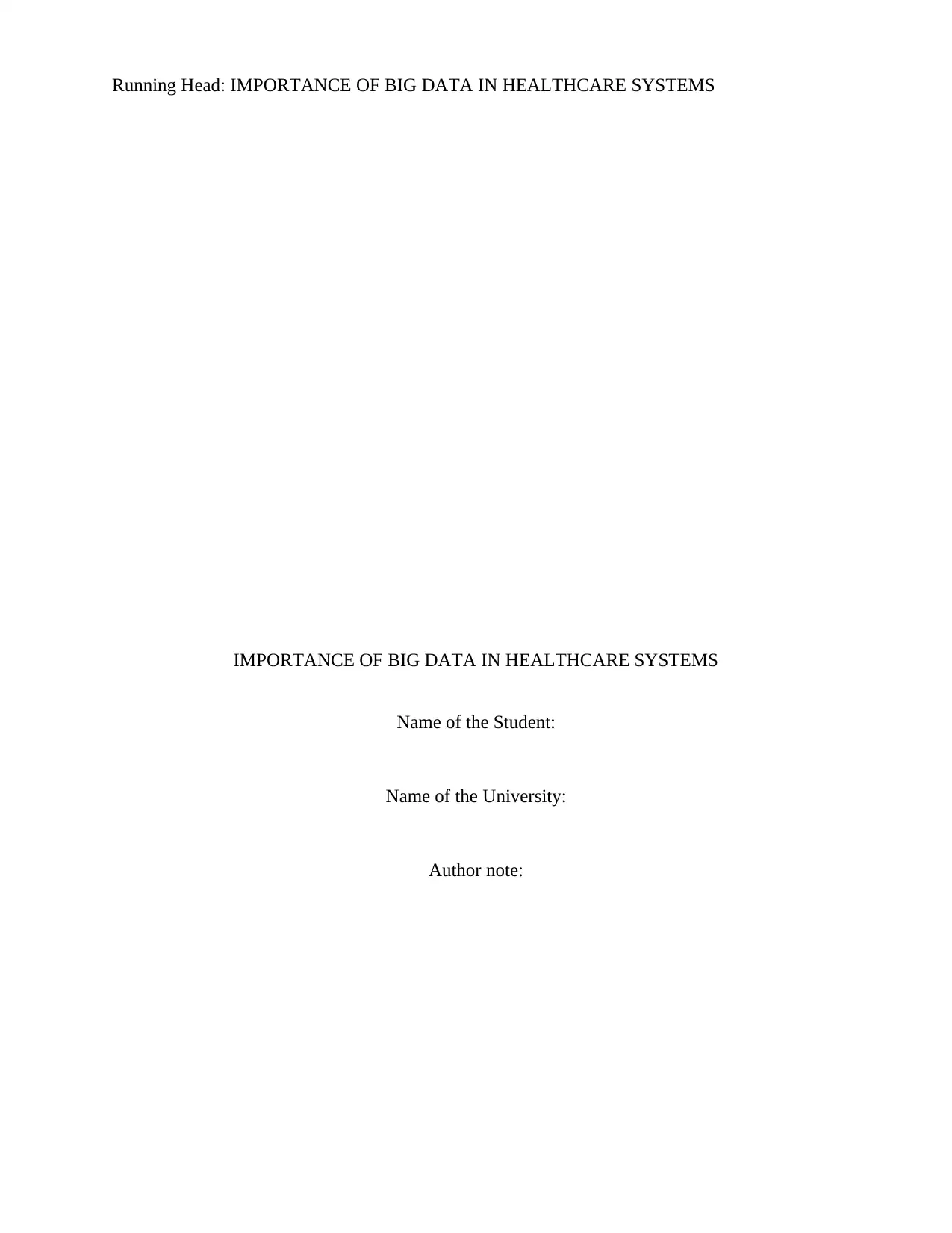
Running Head: IMPORTANCE OF BIG DATA IN HEALTHCARE SYSTEMS
IMPORTANCE OF BIG DATA IN HEALTHCARE SYSTEMS
Name of the Student:
Name of the University:
Author note:
IMPORTANCE OF BIG DATA IN HEALTHCARE SYSTEMS
Name of the Student:
Name of the University:
Author note:
Paraphrase This Document
Need a fresh take? Get an instant paraphrase of this document with our AI Paraphraser
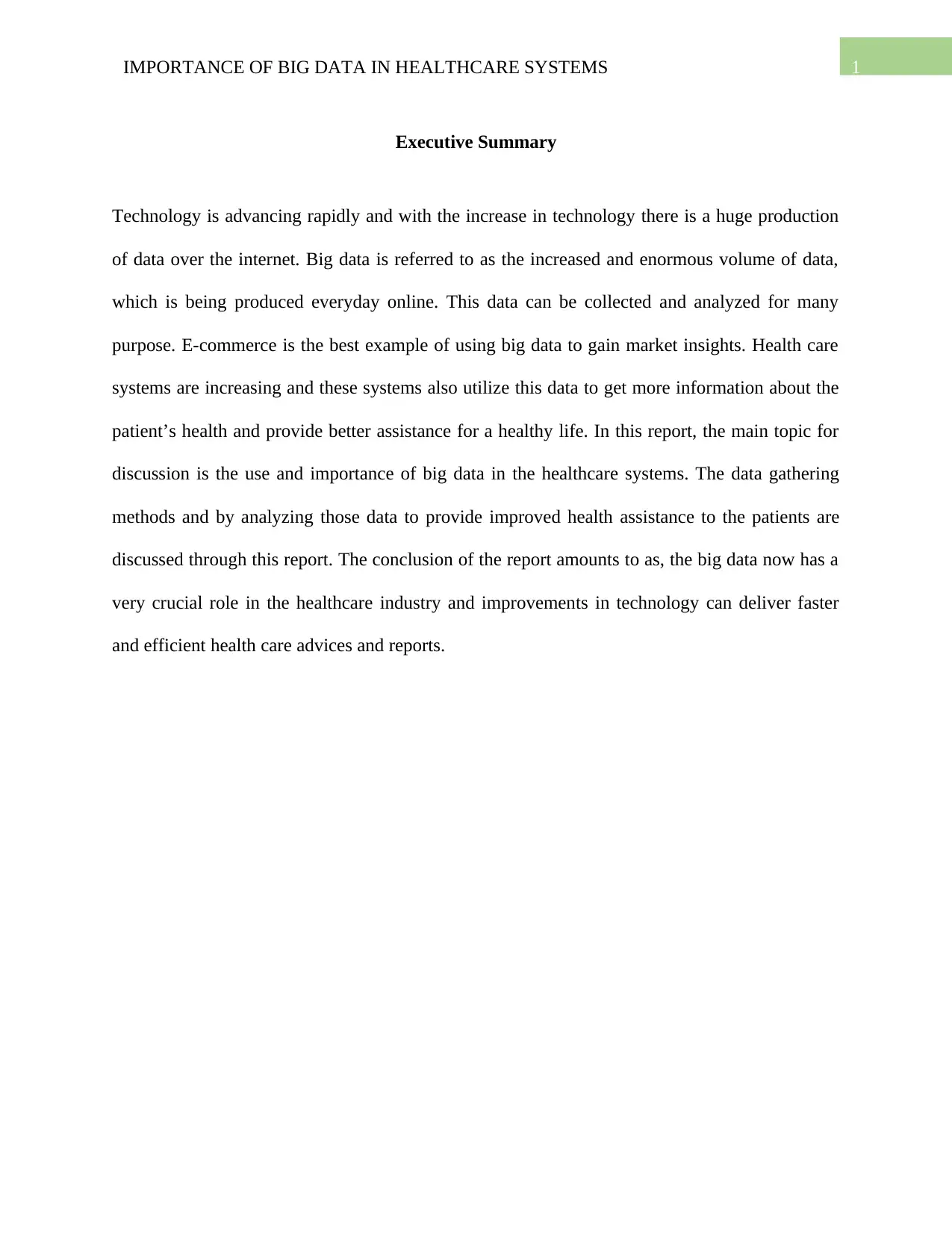
1IMPORTANCE OF BIG DATA IN HEALTHCARE SYSTEMS
Executive Summary
Technology is advancing rapidly and with the increase in technology there is a huge production
of data over the internet. Big data is referred to as the increased and enormous volume of data,
which is being produced everyday online. This data can be collected and analyzed for many
purpose. E-commerce is the best example of using big data to gain market insights. Health care
systems are increasing and these systems also utilize this data to get more information about the
patient’s health and provide better assistance for a healthy life. In this report, the main topic for
discussion is the use and importance of big data in the healthcare systems. The data gathering
methods and by analyzing those data to provide improved health assistance to the patients are
discussed through this report. The conclusion of the report amounts to as, the big data now has a
very crucial role in the healthcare industry and improvements in technology can deliver faster
and efficient health care advices and reports.
Executive Summary
Technology is advancing rapidly and with the increase in technology there is a huge production
of data over the internet. Big data is referred to as the increased and enormous volume of data,
which is being produced everyday online. This data can be collected and analyzed for many
purpose. E-commerce is the best example of using big data to gain market insights. Health care
systems are increasing and these systems also utilize this data to get more information about the
patient’s health and provide better assistance for a healthy life. In this report, the main topic for
discussion is the use and importance of big data in the healthcare systems. The data gathering
methods and by analyzing those data to provide improved health assistance to the patients are
discussed through this report. The conclusion of the report amounts to as, the big data now has a
very crucial role in the healthcare industry and improvements in technology can deliver faster
and efficient health care advices and reports.
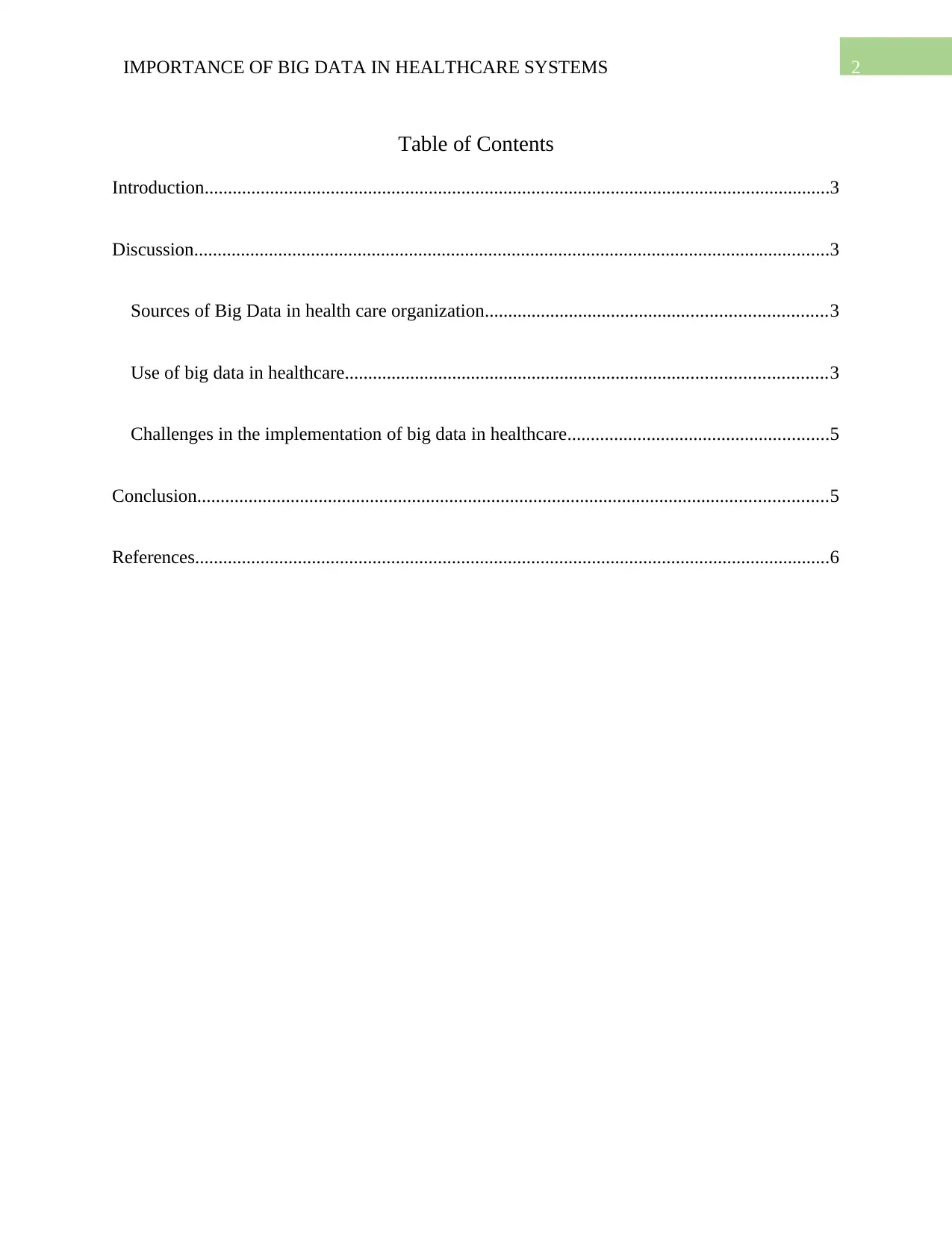
2IMPORTANCE OF BIG DATA IN HEALTHCARE SYSTEMS
Table of Contents
Introduction......................................................................................................................................3
Discussion........................................................................................................................................3
Sources of Big Data in health care organization.........................................................................3
Use of big data in healthcare.......................................................................................................3
Challenges in the implementation of big data in healthcare........................................................5
Conclusion.......................................................................................................................................5
References........................................................................................................................................6
Table of Contents
Introduction......................................................................................................................................3
Discussion........................................................................................................................................3
Sources of Big Data in health care organization.........................................................................3
Use of big data in healthcare.......................................................................................................3
Challenges in the implementation of big data in healthcare........................................................5
Conclusion.......................................................................................................................................5
References........................................................................................................................................6
⊘ This is a preview!⊘
Do you want full access?
Subscribe today to unlock all pages.

Trusted by 1+ million students worldwide
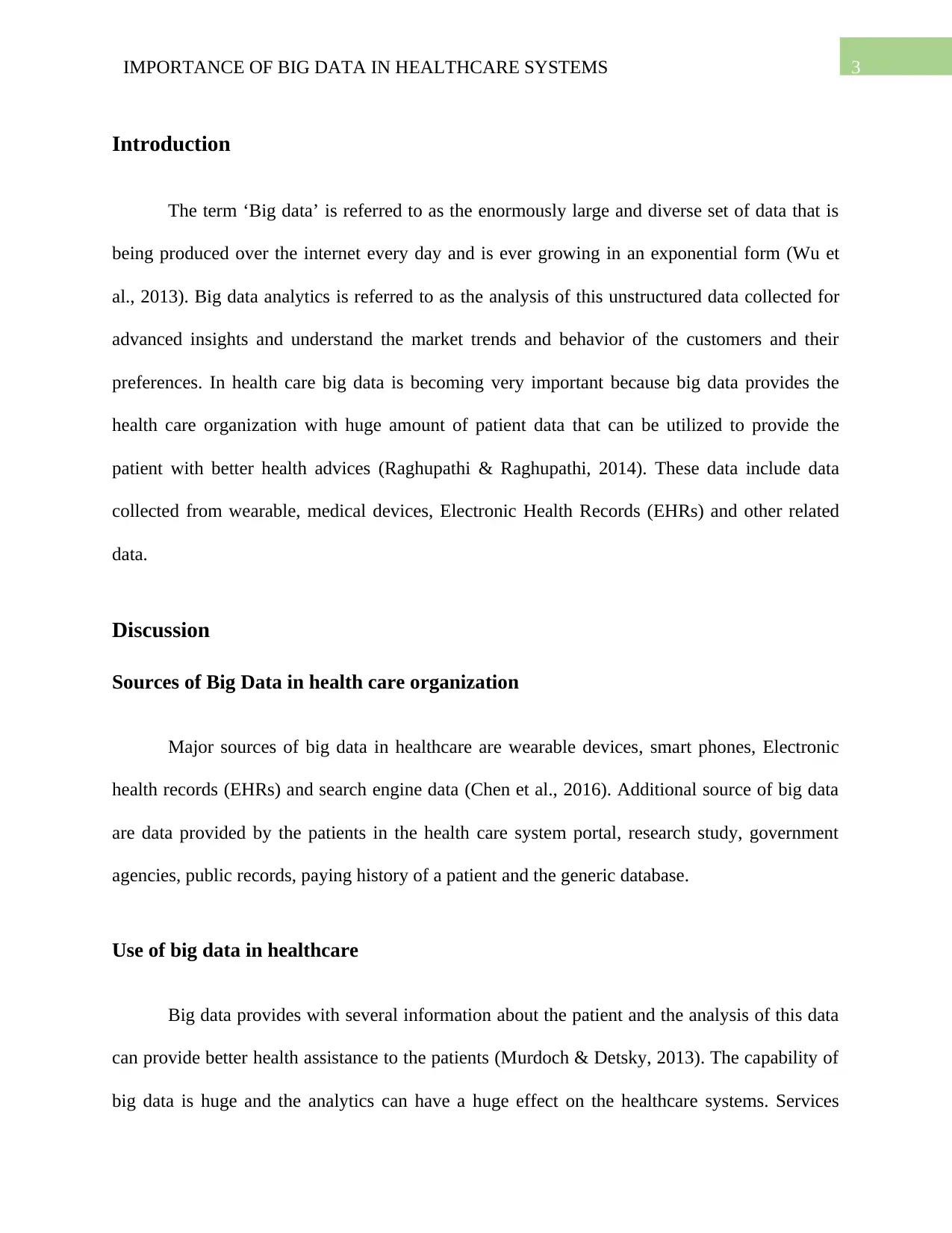
3IMPORTANCE OF BIG DATA IN HEALTHCARE SYSTEMS
Introduction
The term ‘Big data’ is referred to as the enormously large and diverse set of data that is
being produced over the internet every day and is ever growing in an exponential form (Wu et
al., 2013). Big data analytics is referred to as the analysis of this unstructured data collected for
advanced insights and understand the market trends and behavior of the customers and their
preferences. In health care big data is becoming very important because big data provides the
health care organization with huge amount of patient data that can be utilized to provide the
patient with better health advices (Raghupathi & Raghupathi, 2014). These data include data
collected from wearable, medical devices, Electronic Health Records (EHRs) and other related
data.
Discussion
Sources of Big Data in health care organization
Major sources of big data in healthcare are wearable devices, smart phones, Electronic
health records (EHRs) and search engine data (Chen et al., 2016). Additional source of big data
are data provided by the patients in the health care system portal, research study, government
agencies, public records, paying history of a patient and the generic database.
Use of big data in healthcare
Big data provides with several information about the patient and the analysis of this data
can provide better health assistance to the patients (Murdoch & Detsky, 2013). The capability of
big data is huge and the analytics can have a huge effect on the healthcare systems. Services
Introduction
The term ‘Big data’ is referred to as the enormously large and diverse set of data that is
being produced over the internet every day and is ever growing in an exponential form (Wu et
al., 2013). Big data analytics is referred to as the analysis of this unstructured data collected for
advanced insights and understand the market trends and behavior of the customers and their
preferences. In health care big data is becoming very important because big data provides the
health care organization with huge amount of patient data that can be utilized to provide the
patient with better health advices (Raghupathi & Raghupathi, 2014). These data include data
collected from wearable, medical devices, Electronic Health Records (EHRs) and other related
data.
Discussion
Sources of Big Data in health care organization
Major sources of big data in healthcare are wearable devices, smart phones, Electronic
health records (EHRs) and search engine data (Chen et al., 2016). Additional source of big data
are data provided by the patients in the health care system portal, research study, government
agencies, public records, paying history of a patient and the generic database.
Use of big data in healthcare
Big data provides with several information about the patient and the analysis of this data
can provide better health assistance to the patients (Murdoch & Detsky, 2013). The capability of
big data is huge and the analytics can have a huge effect on the healthcare systems. Services
Paraphrase This Document
Need a fresh take? Get an instant paraphrase of this document with our AI Paraphraser
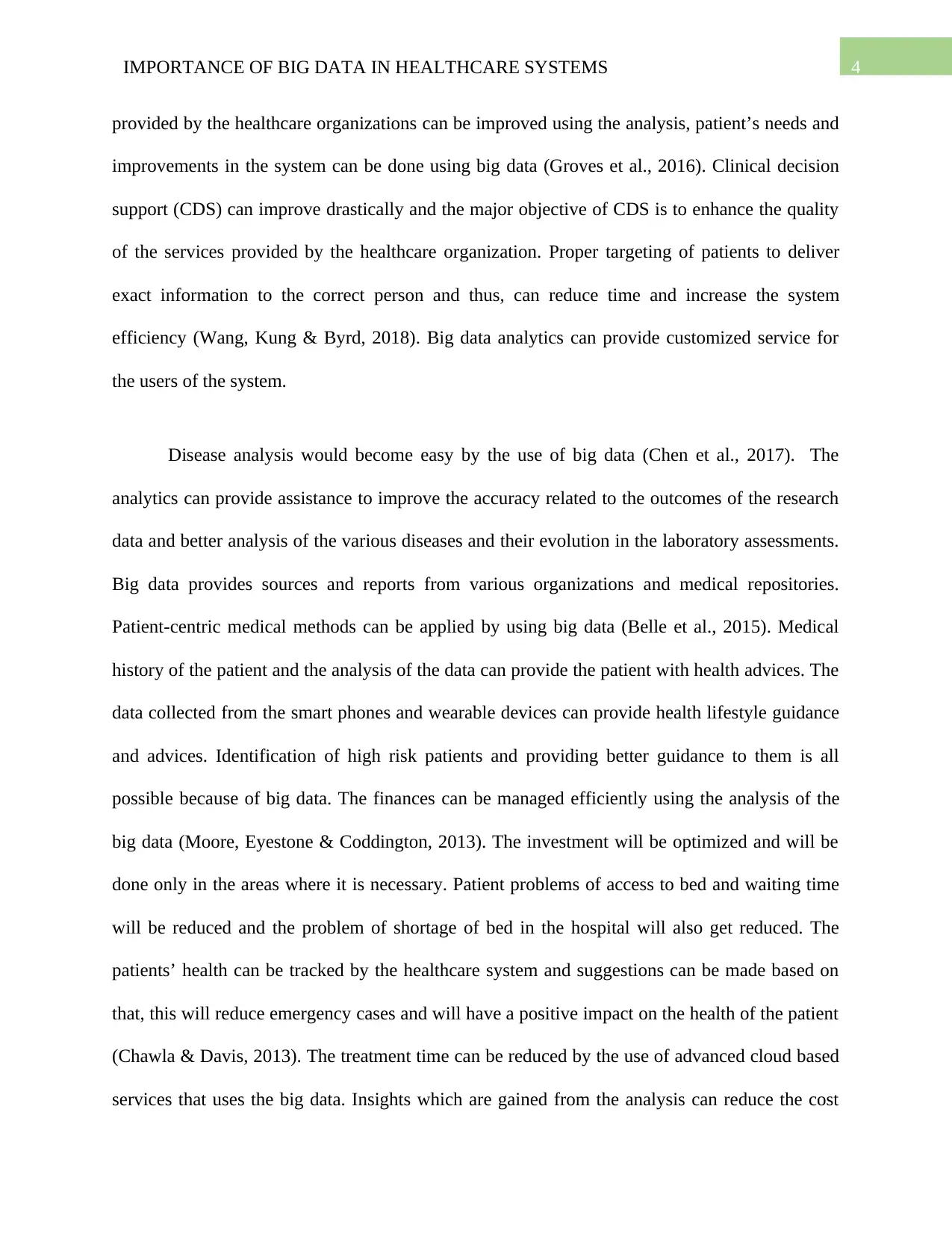
4IMPORTANCE OF BIG DATA IN HEALTHCARE SYSTEMS
provided by the healthcare organizations can be improved using the analysis, patient’s needs and
improvements in the system can be done using big data (Groves et al., 2016). Clinical decision
support (CDS) can improve drastically and the major objective of CDS is to enhance the quality
of the services provided by the healthcare organization. Proper targeting of patients to deliver
exact information to the correct person and thus, can reduce time and increase the system
efficiency (Wang, Kung & Byrd, 2018). Big data analytics can provide customized service for
the users of the system.
Disease analysis would become easy by the use of big data (Chen et al., 2017). The
analytics can provide assistance to improve the accuracy related to the outcomes of the research
data and better analysis of the various diseases and their evolution in the laboratory assessments.
Big data provides sources and reports from various organizations and medical repositories.
Patient-centric medical methods can be applied by using big data (Belle et al., 2015). Medical
history of the patient and the analysis of the data can provide the patient with health advices. The
data collected from the smart phones and wearable devices can provide health lifestyle guidance
and advices. Identification of high risk patients and providing better guidance to them is all
possible because of big data. The finances can be managed efficiently using the analysis of the
big data (Moore, Eyestone & Coddington, 2013). The investment will be optimized and will be
done only in the areas where it is necessary. Patient problems of access to bed and waiting time
will be reduced and the problem of shortage of bed in the hospital will also get reduced. The
patients’ health can be tracked by the healthcare system and suggestions can be made based on
that, this will reduce emergency cases and will have a positive impact on the health of the patient
(Chawla & Davis, 2013). The treatment time can be reduced by the use of advanced cloud based
services that uses the big data. Insights which are gained from the analysis can reduce the cost
provided by the healthcare organizations can be improved using the analysis, patient’s needs and
improvements in the system can be done using big data (Groves et al., 2016). Clinical decision
support (CDS) can improve drastically and the major objective of CDS is to enhance the quality
of the services provided by the healthcare organization. Proper targeting of patients to deliver
exact information to the correct person and thus, can reduce time and increase the system
efficiency (Wang, Kung & Byrd, 2018). Big data analytics can provide customized service for
the users of the system.
Disease analysis would become easy by the use of big data (Chen et al., 2017). The
analytics can provide assistance to improve the accuracy related to the outcomes of the research
data and better analysis of the various diseases and their evolution in the laboratory assessments.
Big data provides sources and reports from various organizations and medical repositories.
Patient-centric medical methods can be applied by using big data (Belle et al., 2015). Medical
history of the patient and the analysis of the data can provide the patient with health advices. The
data collected from the smart phones and wearable devices can provide health lifestyle guidance
and advices. Identification of high risk patients and providing better guidance to them is all
possible because of big data. The finances can be managed efficiently using the analysis of the
big data (Moore, Eyestone & Coddington, 2013). The investment will be optimized and will be
done only in the areas where it is necessary. Patient problems of access to bed and waiting time
will be reduced and the problem of shortage of bed in the hospital will also get reduced. The
patients’ health can be tracked by the healthcare system and suggestions can be made based on
that, this will reduce emergency cases and will have a positive impact on the health of the patient
(Chawla & Davis, 2013). The treatment time can be reduced by the use of advanced cloud based
services that uses the big data. Insights which are gained from the analysis can reduce the cost
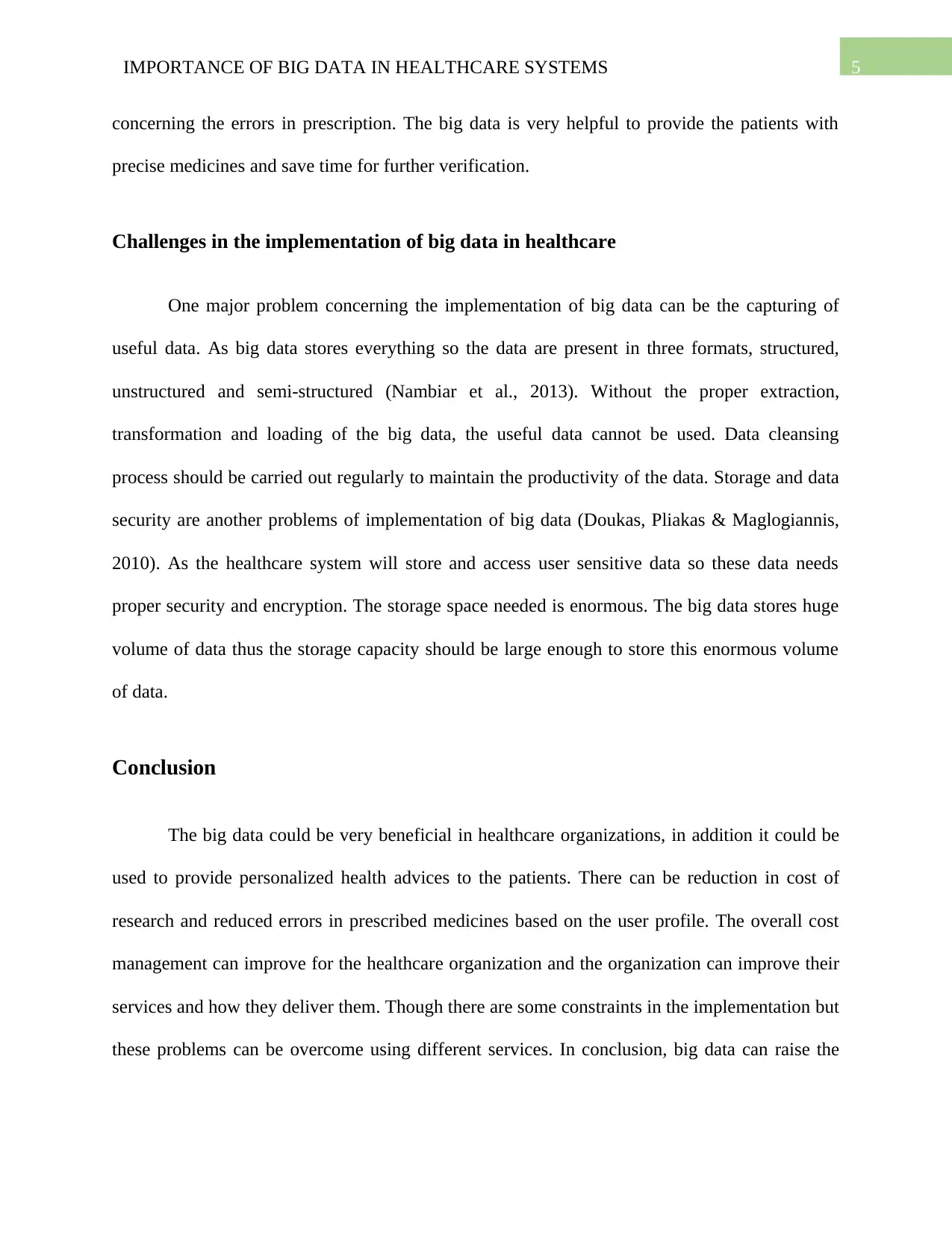
5IMPORTANCE OF BIG DATA IN HEALTHCARE SYSTEMS
concerning the errors in prescription. The big data is very helpful to provide the patients with
precise medicines and save time for further verification.
Challenges in the implementation of big data in healthcare
One major problem concerning the implementation of big data can be the capturing of
useful data. As big data stores everything so the data are present in three formats, structured,
unstructured and semi-structured (Nambiar et al., 2013). Without the proper extraction,
transformation and loading of the big data, the useful data cannot be used. Data cleansing
process should be carried out regularly to maintain the productivity of the data. Storage and data
security are another problems of implementation of big data (Doukas, Pliakas & Maglogiannis,
2010). As the healthcare system will store and access user sensitive data so these data needs
proper security and encryption. The storage space needed is enormous. The big data stores huge
volume of data thus the storage capacity should be large enough to store this enormous volume
of data.
Conclusion
The big data could be very beneficial in healthcare organizations, in addition it could be
used to provide personalized health advices to the patients. There can be reduction in cost of
research and reduced errors in prescribed medicines based on the user profile. The overall cost
management can improve for the healthcare organization and the organization can improve their
services and how they deliver them. Though there are some constraints in the implementation but
these problems can be overcome using different services. In conclusion, big data can raise the
concerning the errors in prescription. The big data is very helpful to provide the patients with
precise medicines and save time for further verification.
Challenges in the implementation of big data in healthcare
One major problem concerning the implementation of big data can be the capturing of
useful data. As big data stores everything so the data are present in three formats, structured,
unstructured and semi-structured (Nambiar et al., 2013). Without the proper extraction,
transformation and loading of the big data, the useful data cannot be used. Data cleansing
process should be carried out regularly to maintain the productivity of the data. Storage and data
security are another problems of implementation of big data (Doukas, Pliakas & Maglogiannis,
2010). As the healthcare system will store and access user sensitive data so these data needs
proper security and encryption. The storage space needed is enormous. The big data stores huge
volume of data thus the storage capacity should be large enough to store this enormous volume
of data.
Conclusion
The big data could be very beneficial in healthcare organizations, in addition it could be
used to provide personalized health advices to the patients. There can be reduction in cost of
research and reduced errors in prescribed medicines based on the user profile. The overall cost
management can improve for the healthcare organization and the organization can improve their
services and how they deliver them. Though there are some constraints in the implementation but
these problems can be overcome using different services. In conclusion, big data can raise the
⊘ This is a preview!⊘
Do you want full access?
Subscribe today to unlock all pages.

Trusted by 1+ million students worldwide

6IMPORTANCE OF BIG DATA IN HEALTHCARE SYSTEMS
productivity of a healthcare organization and the overall performance of the system.
Improvements can be made in the services and how those services are delivered using big data.
productivity of a healthcare organization and the overall performance of the system.
Improvements can be made in the services and how those services are delivered using big data.
Paraphrase This Document
Need a fresh take? Get an instant paraphrase of this document with our AI Paraphraser
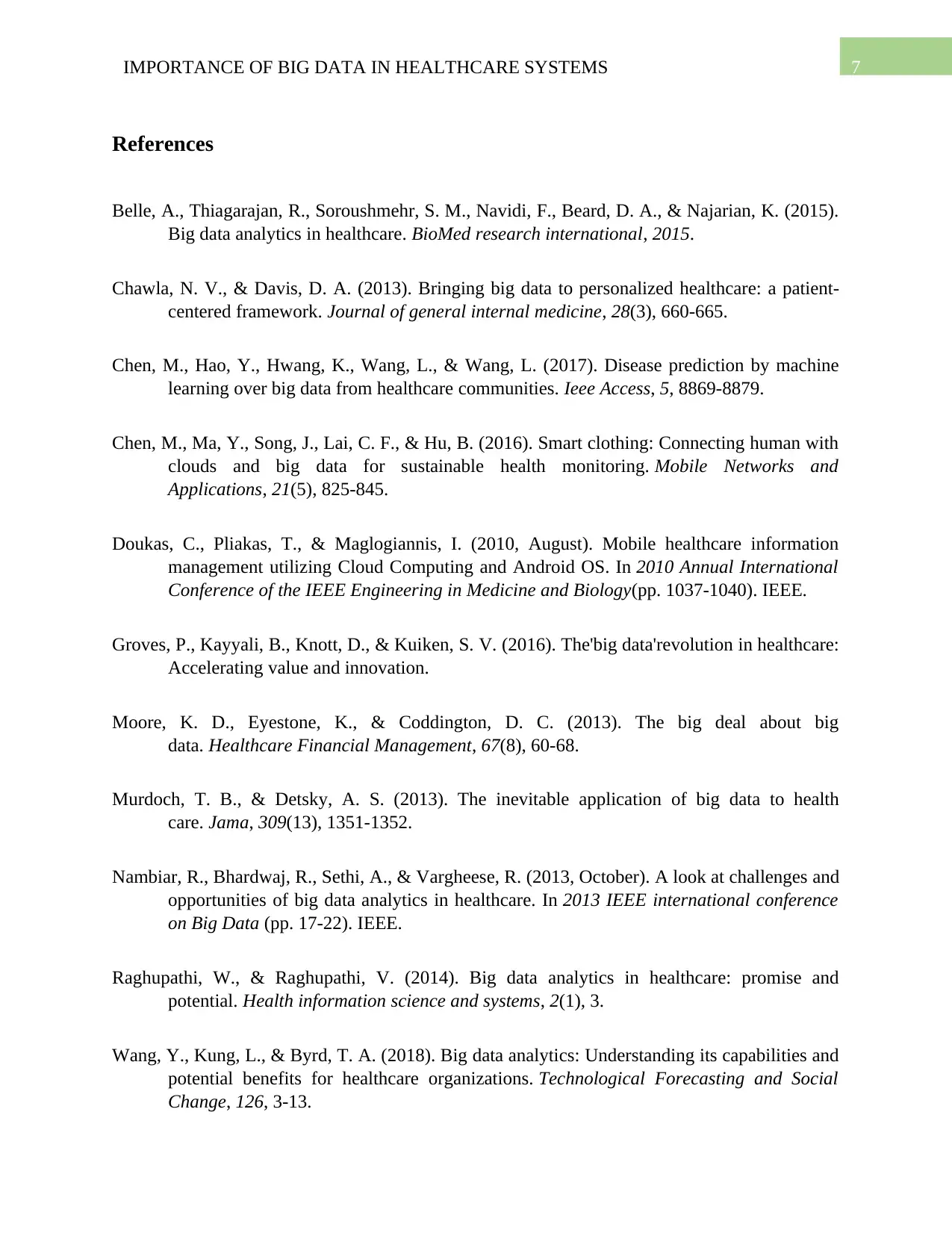
7IMPORTANCE OF BIG DATA IN HEALTHCARE SYSTEMS
References
Belle, A., Thiagarajan, R., Soroushmehr, S. M., Navidi, F., Beard, D. A., & Najarian, K. (2015).
Big data analytics in healthcare. BioMed research international, 2015.
Chawla, N. V., & Davis, D. A. (2013). Bringing big data to personalized healthcare: a patient-
centered framework. Journal of general internal medicine, 28(3), 660-665.
Chen, M., Hao, Y., Hwang, K., Wang, L., & Wang, L. (2017). Disease prediction by machine
learning over big data from healthcare communities. Ieee Access, 5, 8869-8879.
Chen, M., Ma, Y., Song, J., Lai, C. F., & Hu, B. (2016). Smart clothing: Connecting human with
clouds and big data for sustainable health monitoring. Mobile Networks and
Applications, 21(5), 825-845.
Doukas, C., Pliakas, T., & Maglogiannis, I. (2010, August). Mobile healthcare information
management utilizing Cloud Computing and Android OS. In 2010 Annual International
Conference of the IEEE Engineering in Medicine and Biology(pp. 1037-1040). IEEE.
Groves, P., Kayyali, B., Knott, D., & Kuiken, S. V. (2016). The'big data'revolution in healthcare:
Accelerating value and innovation.
Moore, K. D., Eyestone, K., & Coddington, D. C. (2013). The big deal about big
data. Healthcare Financial Management, 67(8), 60-68.
Murdoch, T. B., & Detsky, A. S. (2013). The inevitable application of big data to health
care. Jama, 309(13), 1351-1352.
Nambiar, R., Bhardwaj, R., Sethi, A., & Vargheese, R. (2013, October). A look at challenges and
opportunities of big data analytics in healthcare. In 2013 IEEE international conference
on Big Data (pp. 17-22). IEEE.
Raghupathi, W., & Raghupathi, V. (2014). Big data analytics in healthcare: promise and
potential. Health information science and systems, 2(1), 3.
Wang, Y., Kung, L., & Byrd, T. A. (2018). Big data analytics: Understanding its capabilities and
potential benefits for healthcare organizations. Technological Forecasting and Social
Change, 126, 3-13.
References
Belle, A., Thiagarajan, R., Soroushmehr, S. M., Navidi, F., Beard, D. A., & Najarian, K. (2015).
Big data analytics in healthcare. BioMed research international, 2015.
Chawla, N. V., & Davis, D. A. (2013). Bringing big data to personalized healthcare: a patient-
centered framework. Journal of general internal medicine, 28(3), 660-665.
Chen, M., Hao, Y., Hwang, K., Wang, L., & Wang, L. (2017). Disease prediction by machine
learning over big data from healthcare communities. Ieee Access, 5, 8869-8879.
Chen, M., Ma, Y., Song, J., Lai, C. F., & Hu, B. (2016). Smart clothing: Connecting human with
clouds and big data for sustainable health monitoring. Mobile Networks and
Applications, 21(5), 825-845.
Doukas, C., Pliakas, T., & Maglogiannis, I. (2010, August). Mobile healthcare information
management utilizing Cloud Computing and Android OS. In 2010 Annual International
Conference of the IEEE Engineering in Medicine and Biology(pp. 1037-1040). IEEE.
Groves, P., Kayyali, B., Knott, D., & Kuiken, S. V. (2016). The'big data'revolution in healthcare:
Accelerating value and innovation.
Moore, K. D., Eyestone, K., & Coddington, D. C. (2013). The big deal about big
data. Healthcare Financial Management, 67(8), 60-68.
Murdoch, T. B., & Detsky, A. S. (2013). The inevitable application of big data to health
care. Jama, 309(13), 1351-1352.
Nambiar, R., Bhardwaj, R., Sethi, A., & Vargheese, R. (2013, October). A look at challenges and
opportunities of big data analytics in healthcare. In 2013 IEEE international conference
on Big Data (pp. 17-22). IEEE.
Raghupathi, W., & Raghupathi, V. (2014). Big data analytics in healthcare: promise and
potential. Health information science and systems, 2(1), 3.
Wang, Y., Kung, L., & Byrd, T. A. (2018). Big data analytics: Understanding its capabilities and
potential benefits for healthcare organizations. Technological Forecasting and Social
Change, 126, 3-13.

8IMPORTANCE OF BIG DATA IN HEALTHCARE SYSTEMS
Wu, X., Zhu, X., Wu, G. Q., & Ding, W. (2013). Data mining with big data. IEEE transactions
on knowledge and data engineering, 26(1), 97-107.
Wu, X., Zhu, X., Wu, G. Q., & Ding, W. (2013). Data mining with big data. IEEE transactions
on knowledge and data engineering, 26(1), 97-107.
⊘ This is a preview!⊘
Do you want full access?
Subscribe today to unlock all pages.

Trusted by 1+ million students worldwide
1 out of 9
Related Documents
Your All-in-One AI-Powered Toolkit for Academic Success.
+13062052269
info@desklib.com
Available 24*7 on WhatsApp / Email
![[object Object]](/_next/static/media/star-bottom.7253800d.svg)
Unlock your academic potential
Copyright © 2020–2026 A2Z Services. All Rights Reserved. Developed and managed by ZUCOL.





